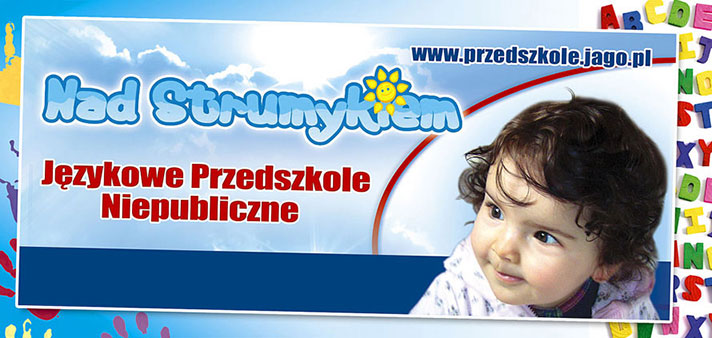Languages - not so foreign anymore
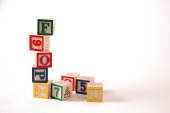
Most research confirms that the earlier a child encounters a second language, the greater are his/her chances of using it as fluently as their own.
A child that starts learning a foreign language even as an infant (the ability naturally disappears after the age of 7-8) is able to master - for their whole life -pronunciation which is comparable with the native speaker's, practically with no features of a foreign accent.
Many linguists attribute the ability to the changes taking place in the developing brain of the small child which is creating in this period new, neurological connections each time a child actively interacts with the new language surroundings.
Of course the matter of time is also crucial here - the more years we devote to language learning, the better we become, as in any other discipline of science or sport.
Following the latest research and achievements in the realm of language learning acquired in the course of over 12 years of language teaching in JAGO Foreign Language Teaching Centre, we decided to utilize our long-term experience in teaching languages to the youngest.
That is why in our bilingual kindergarten we used the innovative method of complete language immersion. In the method children spend a significant portion of time or all their kindergarten stay either using or having direct contact with the target language. Such complete immersion in a foreign language in early childhood builds a long-term linguistic foundation to build on later on in life.
It was proved that children use their right hemisphere in language learning, and that the ability changes with age. The right, empirical hemisphere responsible for the senses, enables the acquisition of language from all types of sources: audio, emotional or tactile or based on practical experience, with the passage of time, the "adult" left hemisphere, based on logical thinking, becomes dominant.
Another essential fact is that children at preschool age, starting as early as the age of three, acquire language solely using their memory, through here and now activities, hence the more frequent the contact with language, the better.
That is why the method of language immersion, as used in our kindergarten, where children practically do not learn but instead experience the language in real life situations in the amount of over 20 hours weekly, is very successful.
The further increase of its efficiency is influenced by the fact that the frequent guests in our kindergarten include carefully selected foreign language teachers (native speakers) from Great Britain, the USA or Germany ensuring the example pronunciation model of a given tongue.
The essential factor in a fully safe and joyful experience by our little guards of the days full of language adventures is also the fact that the foreign language teachers who have contact with children have the basic ability to communicate in the Polish language.
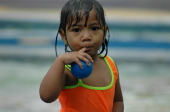
What language shall I choose?
The Non-Public Language Kindergarten "Nad Strumykiem" offers 5 foreign languages: English for everyday purposes and - to choose from: German, French, Spanish or Russian.
In our kindergarten it is parents who decide what languages their child will learn. While the majority of people in Poland (aged 35-64) admit they can speak Russian, it is English that has pushed out all other languages and become lingua franca (the common language of people who use other languages on everyday basis) of the modern world.
Each kindergarten group follows the curriculum of a given language with its teacher – a language specialist, while the more mature groups (beginning at the age of four) may select an additional language (already included in the kindergarten fee).
The advantages and benefits of learning languages using the language immersion method from an early age:
- there is no need to drive children to additional language courses (thus saving time and money); additionally, a child feels safe in the surroundings of the kindergarten where they acquire language with teachers and peers that are known to them to a far bigger and effective extent than is the case with traditional language courses, which will enable them eventually to become a bilingual user of the languages,
- children at preschool age are usually characterized by an increased level of interest and that is why they learn about other nationalities more easily,
- learning a foreign language through immersion develops communicative skills even in the mother tongue of the child,
- children become more creative, their self-esteem is higher and they are able to solve complex problems,
- in most cases learning of a foreign language through immersion also helps in learning other subjects as long as it lasts,
- acquaints children with various cultures and ways of expressing themselves, expands the way they perceive the world and gives them the ability to communicate with a far bigger number of people,
- the child learns additional languages more easily, even later, when s/he is already a grown up,
- our kindergarten is an excellent choice for children from mixed-nationality backgrounds who use two languages at home on daily basis,
- the tolerance of other cultures and nations is fostered,
- children accumulate linguistic and cultural experience, which has positive influence on their general development (cognitive, social, cultural, acoustic, linguistic and personal), as well as the level of determination and participation,
- children possess an inborn ability to learn in an unconscious way, which is especially true of languages, at the early stage of development - all they need to activate it is movement, smile, activity and joy, so this is no longer learning but play!
- a long-term benefit: the fluent knowledge of one or two languages in the future will make it significantly easier to find a better job.
You can find more information concerning the benefits of the immersion method to your child below (both documents in Polish):
- Kompendium dwujęzyczności w przedszkolu.pdf
Size: 104 kB
Curriculum and friends
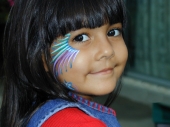
The Curriculum
While selecting the curriculum and course books for your children attending the Non-Public Language Kindergarten "Nad Strumykiem" we made sure:
a) it is in accordance with the latest core curriculum for preschool education as devised by the Ministry of National Education,
b) it is supplemented with additional didactic materials both for children and for the teacher,
c) it is coherent, clear and enables individualisation of its contents according to the cognitive-developmental abilities of children within the group,
d) it enables at any time the assessment of children's progress and establishing whether the child is ready to begin learning at school,
e) it is a modern and effective programme, based on the latest achievements in preschool education.
Series Kolekcja przedszkolaka (The Preschooler's Collection), developed for three-year-olds, four-year-olds and five-year-olds(+) fully met our requirements. The series takes children on a fascinating journey through the elements - the earth, fire, water and air - and their different images as expressed in colours, emotions, associations, seasons. Individual activities and exercises encourage children to make use of their cognitive activity, which facilitates the acquisition of knowledge and skills as we best memorize what we experience or go through.
Each of our charges is supplied with a set of teaching/learning aids:
· „Worksheets” divided into a few parts and „Teaching Aids” in an exercise book form, „The Young Artist's Portfolio”, „My Exercise Book” and, depending on children's age, the appropriate book with the adventures of the younger siblings of the Cricket: „Baj, Bajeczka i zaczarowana owieczka” ("The Fairytale and the Enchanted Lamb"),
· Access to the Internet Educative Portal for children Balon Blum (Bloom Balloon) including over 250 interactive exercises and assisting in the fulfilment of core curriculum.
The teaching/learning packages used in the kindergarten cover all educational areas included in the latest curriculum of preschool education as approved by the Ministry of Education (Dz. U. Item 977, Regulation of the Ministry of Education of 27th August 2012), and at the same enable the development of all the skills that influence the school readiness of a child.
The main premises of our work:
1. As early education needs to be versatile, varied and flexible so that a place for each child could be found for each child, we assume in our work that a kindergarten group is a community of learning people and that a child is to be active in it.
2. In our kindergarten children „are not taught by the teacher”, in which case they are stimulated by a direct question, but instead „they learn with the support of the teacher”, where the stimulus is related to a need and/or a task „stemming from the child's everyday life, the here-and-now ”.
3. The actions of the child are not determined and planned in advance by the teacher within the framework imposed by the educational system – instead, children look for knowledge in the educational environment created by the teacher learning, what they search for and need, acquiring the knowledge on their own.
4. The teacher does not progress from one item to another but follows the principle of individualisation, adjusting the content to the specificity of children in the group and their cognitive-developmental abilities.
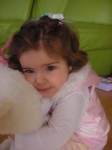
Zippie's Friends
There is an additional, precious development of the core curriculum in our kindergarten: it is the programme Zippie's Friends.
It is an international programme of the English organization Partnership for Children, which shapes and develops psycho-social abilities as well as mental and emotional health in small children. It teaches various ways of coping with difficulties and applying the acquired skills to everyday life as well as develops the relationships of children with other people.
It does not focus on children with specific problems or difficulties but promotes emotional health of all small children aged 5-7 and has been so far implemented in 16 countries all over the world, helping over 120,000 children annually.
Following its approval and trial implementation in Poland in 2005 by the central public teachers' development facility of the national significance (CMPPP), created by the Minister of National Education, the programme Zippie's Friends has been successfully implemented for five years throughout Poland.
The main premise of Zippie's Friends is very simple – if our children learn how to cope with difficulties encountered while they are still children, they will far better cope with difficulties, problems and crises in their adolescence and adulthood.
The programme includes 6 parts: Feelings, Communication, Making and Breaking Relationships, Solving Conflicts, Coping with Changes and Losses, We Are Managing
Each part has its own story with the adventures of: Sandy, Lilly, Finn and Tigg, illustrated with a set of colourful pictures and tasks to perform such as drawing or role-playing, which children simply adore.
The programme teaches children:
- How to determine their own feelings and talk about them.
- How to establish and cherish friendships,
- How to solve conflicts,
- How to cope with change and loss,
- How to adapt to new situations,
- How to help others,
- How to ask for help and manage in difficult situations,
- How to listen carefully,
- How to say sorry,
- How to say what you want to say.
Created especially for children at different ability levels, Zippie's Friends teach how to cope with everyday problems, how to name feelings and discuss them and how to select one's own ways of coping with different situations. The programme also encourages children to help others with their problems.
As a result of its implementation, children are better at solving conflict situations, the acts of aggression are less frequent and children talk about their feelings more bravely and when they have a problem, they are more eager to seek help from their teacher. Parents are also involved in the implementation of the programme.
One of the important features of Zippie's Friends is that it was created as a universal programme, in contrast to other programmes that concentrate on helping children experience specific problems or difficulties, that is why it may help all children.
Zippie's Friends does not directly tell children what to do, it does not even suggest: "This solution is good and that is bad". Instead, it encourages children to analyse the encountered life situations in an active and critical way and to reflect upon oneself.
It also shows how important it is to talk to others when we experience sadness or anger, as well as how important it is to listen to them when they experience tough moments.
In short, the implementation of the programme "Zippie's Friends" helps children all over the world to develop the key social-interpersonal skills which are so important nowadays and, as a result, improve the current and future emotional state of our little ones.
See more at:
http://www.partnershipforchildren.org.uk/zippy-s-friends.html
Playing with a Four-Legged Friend

Every week in our kindergarten there is „Let's Meet an Animal Day”.
Those are regular meetings at which children meet a dog, a pony, a horse, a duck and other animals under the supervision of an instructor. Such a form of experiencing nature brings a lot of benefits.
The emotional development of the child that stems from meeting animals may later on be applied to interpersonal relationships, as the contact with animals:
- Teaches friendship
- Calms down - helps to alleviate stress and tension, lowers blood pressure (hence the growing popularity of dog therapy in dealing with hyperactivity in some children)
- Develops empathy
- Increases the chances of establishing good relationships with peers - finding a group of friends or acquaintances
- Develops sensitivity and perceptiveness
- Develops curiosity of the world and activates cognitive abilities in children
- Increases activity and mobility which are so crucial at this age
- Fosters self-esteem and belief in child's own success
- Teaches tolerance
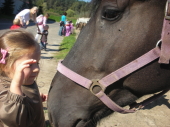
Research proved that children who have regular contact with animals are far better developed emotionally than children who are isolated from them. Additionally, through experiencing, observing and analysing such encounters with animals a child experiences the full range of emotions, a phenomenon largely absent in human contact.
You may only imagine how great an experience and a breakaway from the daily routine can a simple visit in a stable be! Close contact with big animals and learning their calls is highly stimulating to a child that does not know the village life first hand. The smell of hay and cattle food stimulates the sense of smell and the contact with the soft skin of the horse and stroking its mane stimulates the sense of touch.
That is why in our kindergarten we experience nature and through regular contact develop more fully, become more sensitive to the needs of other people and the world of nature that surrounds us.
In preparation for „A Day of Meeting Animals” we exploit the immediate closeness of the Voivodeship Centre for Sports and Recreation, where one can find a stud farm with ponies, ponds with ducks and an additional playground for children, the activities with dogs, with elements of dog therapy, are carried out on the premises of our kindergarten.
Dancing and Break Dancing
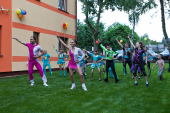
Every week in our kindergarten there are dancing activities for all the children: Zumba, hip-hop with English and classical dancing.
Both the "break dancing" and the more classical dance to the rhythm of music from all over the world are conducted by our trusted and talented dance instructors, motivating children to experience the passion for music and dance with all their senses :)
ZUMBA JAMMER, professional dancing instructress, MASTERCLASS fitness instructress, educator, socio-therapist, organiser of cultural activities and health propagator, dancer and choreographer.
Holds the international S class in Latin American dancing, professional dancing instructor, educator, licensed Zumba instructor.
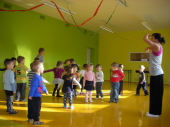
Rhythmics
The completion to the dancing classes are the weekly rhythmics classes which are a method of educating through art in music education.
The method shapes the basic music abilities and transfers the knowledge of music through movement, singing and creativity. It is based on the understanding of the need for movement and activity present in every child and its aim is to educate a person that is sensitive to art and yet independent, intelligent, active, physically fit, in short: a future recipient of music, often its performer or creator.
The dancing and rhythmics classes are taught to all the children attending the kindergarten without any additional fees.
Hands up!

In the course of their kindergarten stay children spend a lot of time on physical activity using three playgrounds, the forest and green recreational grounds that surround the facility. In our kindergarten there are also karate and tennis which exploit the neighbouring facilities of the Voivodeship Centre for Sports and Recreation (tennis court, table tennis).
If the weather is bad, the children make use of the gym, where they have classes organized by their teachers. Every morning, before breakfast, we welcome the day with some general exercise :)
Interesting Visitors
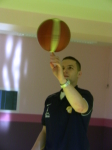
In the curriculum implemented in our facility there are regular, monthly visits of Interesting guests within the two independent topical series: „Career Day” and „Around the World Day”.
CAREER DAY ("Dzień Kariery") is a cycle of meetings with people performing interesting jobs and directed at children (e.g. a vet, a basketball player, a fire-fighter, a police officer, a planner, an architect, an interior designer, etc.).
These are persons specifically chosen by us, often well-known, who can tell the children about their job in an interesting and comprehensible way. During such meetings children actively participate in experiments, tasks and contests prepared by such persons so that they can get into a given profession better.
It is our tradition to prepare questions with the children that they later on ask their guest.
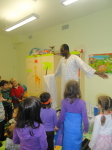
AROUND THE WORLD DAY ("Dzień Dookoła Świata") is a day when we entertain representatives of other nationalities. They tell us interesting things about their country, culture and tradition and leave us souvenirs connected with their countries of origin.
In addition to an undoubtedly cognitive interest and the play factor, the meetings are perfect when it comes to following the core curriculum of the Ministry of Education and into the programme implemented in our facility:
"Due to the democratization of social life, intercultural education, understood as the ability to meet and empathise with "Stranger" who has the same rights, no matter what social standing, political views, confession, language, sex, skin colour or race becomes essential.
The contemporary kindergarten takes into account the multiculturalism of its children and the teacher knows and shows to the children the symbols of other cultures, confessions, the codes that they use. (…)
Introducing the child into the world of culture, habits, norms, traditions, customs, history, holidays, literature, music evokes emotions, stimulates the curiosity of the world, makes one sensitive to patriotic and civic attitudes”
("Together in Kindergarten" / Kindergarten Curriculum)
Preventing speech problems/defects

„The correct speech development
is the foundation of MAN's education”
M. Sovak
Dear Parents!
We inform that the speech therapy lab operating in our kindergarten can be used free of charge by the children attending our facility. They can make use of all the therapeutic offers free of charge (including the weekly individual meeting with a speech therapist), other clients are served in accordance with the price list suggested.
Speech has an important role to play in social relations of a human being with other people. The ability to communicate with others effectively, that is sending, receiving and fully comprehending verbal messages, is crucial: verbal communication of needs, meeting new people, success at school, functioning within a group, creating permanent emotional bonds all depend on it.
That is why it is necessary to stimulate speech development, as we indeed do in our kindergarten, even at a preschool age, that is at the time of intensive development in all the aspects.
Unfortunately, that development is not always correct. The research conducted as well as the observation of communicative behaviour among preschool children (3-6 years) reveal bigger or smaller irregularities in their speech development.
That is why the need to create and implement the preventive speech therapy programme, fully implemented in our facility, was connected with the current increase in the needs in the surrounding reality concerning the increase in the children who need help in the scope of speech development as well as their own vocational experience.
We are deeply convinced of the important role of prevention in effective and correct use of speech by children at preschool age and conscious of the great opportunities stemming from stimulating the speech centres in children under the age of 6.
Considering the above, speech therapy in our kindergarten is always present and is accomplished in both group and regular individual activities with the children that need the support.
As a result, the following are possible:
- early detection of speech irregularities, speech problems and implementing the necessary corrective measures;
- preventing interdental speech;
- early implementation of corrective and preventive measures in children that reveal specific dysfunctions within the chewing and breathing apparatus;
- covering children that need help in the scope of speech irregularities and defects detected with systematic speech therapy;
- facilitating the process of language communication;
- levelling child's educational opportunities;
- building self-esteem and acceptance, creating positive self-assessment.
Additionally, and as a result of the preventive speech therapy programme your child will:
- participate eagerly in the suggested activities and exercises, being able to focus his/her attention on them;
- do exercises on their own or within a group;
- breathe correctly;
- verticalize his/her tongue and have a flexible speech apparatus;
- swallow correctly;
- achieve therapeutic success in terms of the condition of speech or pronunciation;
- possess rich vocabulary and well developed descriptive speech;
- communicate efficiently with his/her surroundings, express his/her opinions;
- achieve educational success within the scope of his/her skills and abilities*
Wisława Glińska, M.A. speech therapist, preschool teacher
The Non-Public Language Kindergarten "Nad Strumykiem"
* the preventive speech therapy programme as implemented in our facility utilizes the following methods:
- Veronica Sherbourne's Method,
- Good Start Method,
- Bronisław Rocławski's Method,
- Maria Montessori's Method,
- educational kinesiology method.



